Ten top shows featuring in the 2024 Adelaide Festival
When there’s 64 epic Adelaide Festival shows to see, no one can afford to go to everything! Here’s our arts team’s top 10 picks.
SA Weekend
Don't miss out on the headlines from SA Weekend. Followed categories will be added to My News.
The 2024 Adelaide Festival is set to captivate our state in Mad March.
Running from March 1-17, the festival will play host to 64 events, including 16 show premieres.
The Advertiser’s Arts Editor Patrick McDonald and Deputy Head of Arts and Entertainment Anna Vlach have cast their eye through the program.
With the help of festival organisers, we’ve compiled this guide of some of the top shows to set your sights on.
GUURANDA
Her Majesty’s Theatre from February 29 to March 3
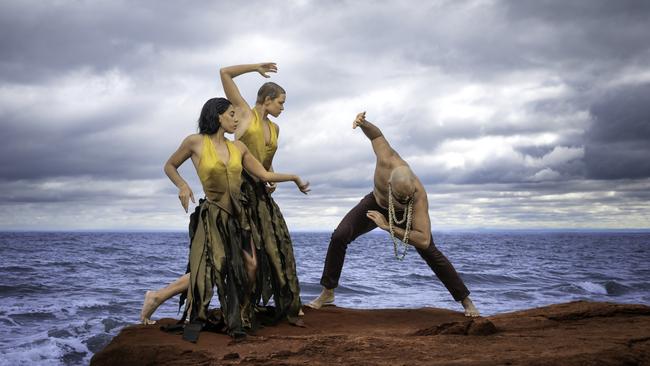
Acts of creation are at the core of any form of art, from storytelling, drama and dance to painting, puppetry and song.
Multi-disciplinary theatre maker and choreographer Jacob Boehme will bring these contemporary art forms together with the cultural heritage of his own Narungga people to tell the creation stories of Guuranda – or Yorke Peninsula – in a vibrant new work for the 2024 Adelaide Festival.
The project started in 2021 with a large community consultation in Innes National Park, which had marked the 50th anniversary of its proclamation the previous year by being jointly renamed Dhilba Guuranda and starting a co-management agreement with its Narungga traditional owners.
“It was identified that Narungga community wanted to see, at some point, a major project or work of scale done about our dreaming stories and our culture, and the land that is Guuranda, or Yorke Peninsula,” Boehme says.
“It started with community first, and then we reached out to the Adelaide Festival.”
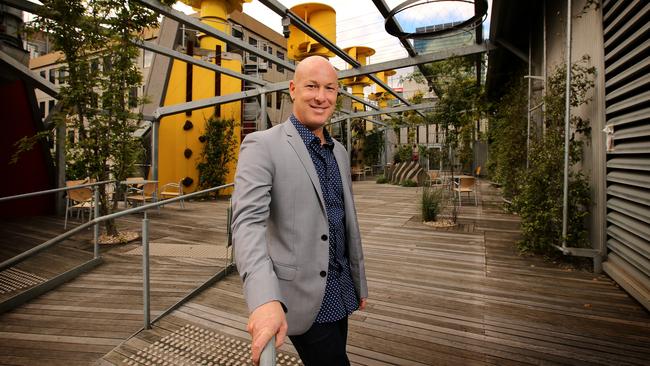
The festival’s new artistic director, Ruth Mackenzie, and chief executive Kath Mainland shared the ambition to create a work of major scale, and green lit the Guuranda project.
“The executive leadership team at Adelaide Festival have walked country with us … they know these stories now; they are part of the family,” Boehme says. “We’ve all been instructed to call Mackenzie ‘Aunty Ruth’. They’ve come on this journey with full investment – not just money, it’s like body and soul.”
Although born and raised in Melbourne, Boehme has maintained strong relationships with his Narungga and Kaurna heritage.
He has choreographed for the opening ceremonies of the FINA World Swimming Championships, Cricket World Cup, The Dreaming Festival and Dreamtime at the ‘G, and was the founding creative director of Melbourne’s First Nations festival Yirramboi.
Boehme previously presented his solo performance work, Blood on the Dancefloor, at Tandanya in 2019, and his multi-year research and revival project Wild Dog – which connects songlines and ceremonies about the dingo – as part of last year’s Tarnanthi Festival for Country Arts SA. “It’s almost like the prodigal son returns,” he laughs.
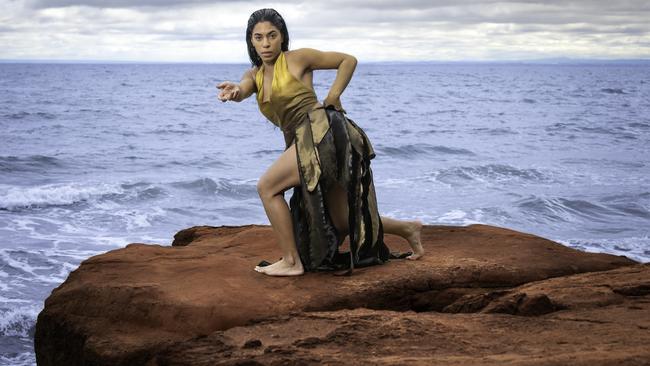
Boehme has made frequent visits back to Yorke Peninsula, where the Narungga elders have acted as “consultants and dramaturges” for Guuranda.
The cast will feature almost 40 performers, both on stage and – in some cases – as a digital presence. First Nations dancers have been drawn from around the country but, where possible, Boehme has put Narungga family and artists in lead creative roles.
“I wanted the set and costumes to all be influenced by a Narungga sensibility,” he says.
The work will focus on three of the main Narungga creation stores, chosen from 33 at the project’s outset. “It’s almost like we are making three works in one – it’s massive,” Boehme says.
“The overarching link between all of these stories … is the creation of the Yorke Peninsula, so it’s a very local story. Most Adelaideans would know the Yorkes as a place to go for a school holiday, or a fishing trip, or a surfing trip, but I doubt they would know these stories. Those red cliffs over at Ardrossan, this is what they mean to us. It’s a very South Australian show for a South Australia audience: this is what’s under your nose.”
THE THREEPENNY OPERA
Her Majesty’s Theatre, from Wednesday, March 6 to Sunday, March 10
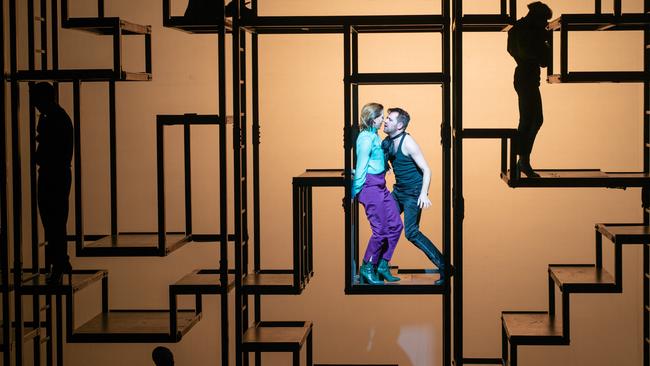
It takes a lot to rattle Barrie Kosky, one of Australia’s most famous expatriate theatre and opera directors.
But when he answered a phone call and received a proposition from Berliner Ensemble artistic director Oliver Reese he admits it was “fairly intimidating”.
“He said to me ‘Barrie, I want you to direct the new Threepenny Opera’,” Kosky recalls.
“One part of you goes ‘Yay, fantastic’ and the other part of you goes “F**k, I’ve been asked to direct the most famous iconic production of the Berliner Ensemble, which was rehearsed on and premiered on the stage that I will be working on’.”
The invitation came almost 100 years after the 1928 premiere of Die Dreigroschenoper (The Threepenny Opera), Kurt Weill and Bertolt Brecht’s most celebrated collaboration. It spawned the seductive earworm Mack the Knife, which went mainstream when pop idol Bobby Darin recorded it in 1959.
And Kosky wasn’t just working on the stage of the The Threepenny Opera but sitting at Brecht’s own wooden production desk.
But if Kosky really was, as he says, “quietly petrified”, he quickly got over it, in no small part thanks to his “affinity with Berlin audiences … They know me and I know them”.
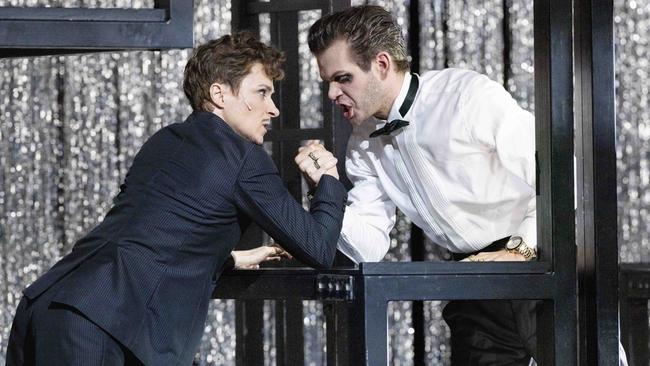
Coming to the Adelaide Festival in 2024 for its Australian premiere, Kosky’s Threepenny Opera opened at the Berliner Ensemble a little over two years ago.
It was a much-anticipated debut because of Covid postponements. For Kosky, the cycle of delayed premieres was a “saving grace” because the extra 18 months resulted in a “polished performance”.
The first premiere to play out in Berlin since the pandemic started, it was joyously received by its audience and also a huge hit at the Edinburgh International Festival: “It’s just been an incredible, extraordinary success.”
It was a big deal for Kosky, a Melbourne-born former artistic director of the Adelaide Festival; The Threepenny Opera had been on his bucket list for decades.
While The Threepenny Opera was written when Berlin was in the middle of the Weimar Republic – a period of extraordinary artistic innovation – and the Nazis and Hitler were on the rise, Kosky notes it is also timeless: “Corruption, loneliness, the loneliness of love, abuse of power, poverty, the rise of criminals through money into wealthy middle class people … these are timeless themes,” he says.

For Kosky, his interpretation of the “tricky piece”, that broke the mould of theatre in its day, required a set that also defied convention.
The challenge for Kosky and set designer Rebecca Ringst was to create a city.
“We didn’t want to put skyscrapers on stage and didn’t want it to be realistic,” he says.
“It splits up and comes in different permutations and it puts the actors in very unusual situations,” Kosky says, adding it is also like a jungle gym that renders the singing and dancing actors physically exhausted after each performance.
“It’s not just people standing and talking. Sometimes they’re crouched, sometimes they’re upside down and it becomes a sort of playground and contributes enormously to the success of the production.”
GOODBYE, LINDITA
Dunstan Playhouse, February 29 to March 3
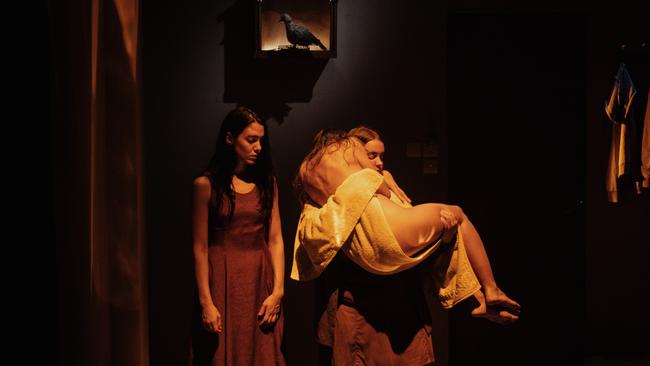
Athens, the ancient birth place of western theatre, is once again being hailed as a creative crucible – or perhaps more of a cultural melting pot – where genres are being reinvented and mediums combined in ways which have critics raving.
Among its new breed of artists, none is hotter right now than Albanian-born Mario Banushi who, at the age of just 25, has had only his second-ever work, Goodbye, Lindita, booked for next year’s Adelaide Festival.
It’s also a major coup for the festival’s new artistic director Ruth Mackenzie, as programmers around the world clambered to secure Banushi’s show after its premiere at the National Theatre of Greece earlier this year.
“I am looking at Greek identity in a Balkan way,” says Banushi, who brings the immigrant experience and Albanian culture to remake the traditional concept of Greek tragedy in a contemporary mould.
“To understand these tragedies you have to speak of death and family loss as we see and feel them today.”
Banushi’s works are deeply personal but, being without spoken dialogue, also have a universal connection in their fusion of ritual and performance art.
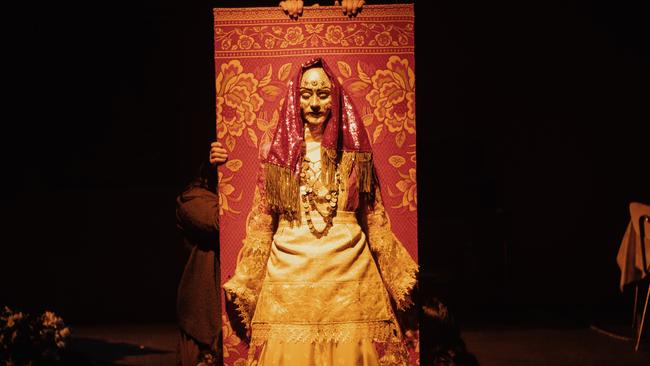
Goodbye, Lindita tracks a family and the house where they live as domestic chores become entwined with poetic imagery and cultural rituals, and strange events bring to the surface a hidden world of dreams and nightmares.
“Lindita was the name of my stepmother who died three days before my father died. They were an incredibly loving couple who couldn’t live apart,” Banushi says.
“Her name in Albanian means ‘the day of birth’ and it is interesting to me that the title of a play that talks about mourning is called ‘Goodbye to the day of birth’.
“Goodbye Lindita is a story about how to say goodbye to a departing human, about how to leave her/his clothes behind, her/his things, the memories you have with her/him, and seeing that you can’t leave anything behind unless you leave yourself.
“This is expressed through the power of the image or through the power of sound and smell, like when we look at old photos in albums and this travels (transports) us somewhere, or something is cooking and the smell reminds us of someone.”
When thanked by women who have seen his plays and are moved by them, Banushi says he feels “a certain redemption”.
“The female figure plays an automatic role in my works. I grew up with them. I understand them more: My mothers, my aunts, my grandmothers, my friends.”
Banushi also uses “tactile” elements on stage – such as water, flour or milk – to heighten the senses for both performers and the audience.
“I would say that I am a child of nature, since I grew up in a village where I have had direct contact with the soil, the animals, the trees, the vegetables, the smells. It’s what I know.”
JUNGLE BOOK REIMAGINED
Festival Theatre, March 15-16
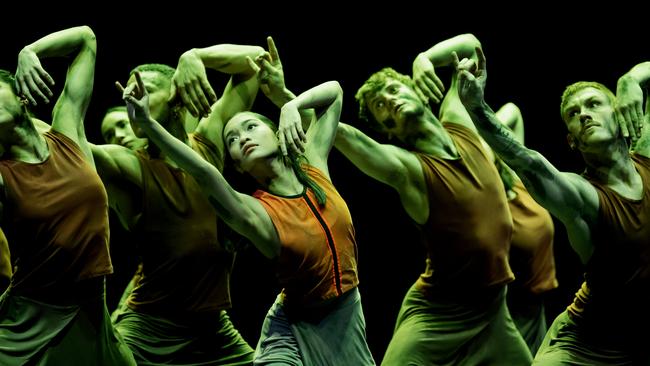
More than simply playing a female version of Mowgli in English choreographer Akram Khan’s bold, near-future reimagining of family favourite The Jungle Book, dancer Jan Mikaela Villanueva also embodies the philosophy behind the work.
As a school student in the Philippines, Villanueva won a national essay competition on climate change with the theme of “Children as Stewards of God’s Creation”.
“I came up with the conclusion that it all starts with the awareness – not necessarily eliminating the problem right away – and the little things that could make a huge difference,” she says from Rome, where the production opened in September.
Now, 12 years after that essay, she says that fight is more relevant than ever – as Khan’s Jungle Book reimagined explores in a world ravaged by rising oceans, where nature is clawing back its claim to the territory that mankind has been forced to flee.
“It was very interesting to come back full circle, and somehow lead the fight against climate change one step at a time,” Villanueva says.
As part of the 2024 Adelaide Festival, Jungle Book reimagined will continue a long tradition of Khan performing or presenting his works here, including his Olivier Award-winning final full-length solo piece, XENOS, in 2018.
Having himself played Mowgli in an Indian dance production as a child, Khan says The Jungle Book has always held special meaning for him “because of the three deep lessons it held within it”.
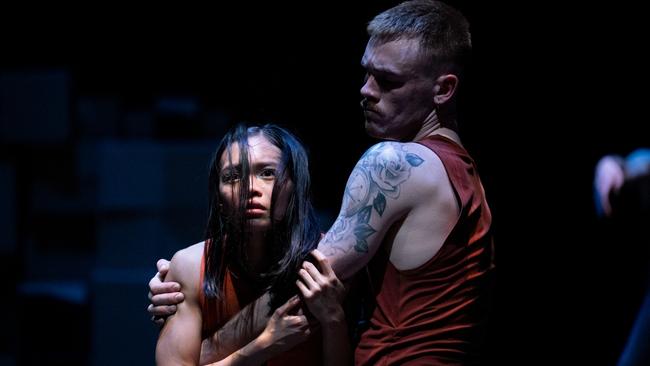
In his production notes, Khan details those as: “The lessons of commonality between species, the binding interdependence between humans, animals and nature, and finally, a sense of family and our need to belong.”
While Rudyard Kipling’s original 1894 book deals with themes of abandonment, fostering, laws and freedom, Khan wanted to remould its collection of stories to address new issues for younger generations.
“We are now living in unprecedented and uncertain times, not only for our species but for all species on this planet,” Khan says.
“And the root cause of this conundrum is because we have forgotten our connection to our home, our planet. So I believe that we must make changes from the grassroots up, if we are to see a brighter future.”
Jungle Book reimagined uses prerecorded dialogue as well as movement and animation to tell its version of story. Villanueva says there is also a lot of physical and verbal comedy, particularly from the characters of Baloo the bear and Bagheera.
In Khan’s version of the story, Mowgli is a young girl who is lost at sea as her family flees rising flood waters. She is washed ashore on an island which is actually the deserted ruins of a city, where vegetation and escaped zoo animals have begun to reclaim the buildings and streets, creating a literal “urban jungle”.
“It’s a reflection of how our actions could impact in the future,” Villanueva says.
Khan’s own experience of having to adapt to communications technology during the pandemic led him to use projections and animation in place of most of the usual physical sets for this production, thus reducing its impact on the environment when it comes to touring.
Villanueva says it is a family-friendly show. “There are themes on love, on family, on compassion, that I think they will really enjoy,” she says.
SIX MORE FESTIVAL PICKS
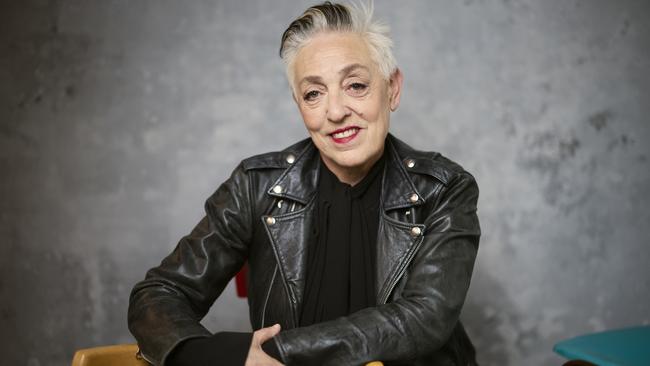
Create4Adelaide
Bicentennial Conservatory, Adelaide Botanic Garden, February 29-March 17
More than 2000 South Australians voted in the Create4Adelaide survey to select three climate priorities that would become the focus of the project: extinction of animals and plants, extreme weather events, such as floods and fires, and pollution of our air and waterways. These became the basis for exceptional art created by young people.
Private View
Restless Dance Theatre, Odeon Theatre, Norwood, February 29-March 9
Private View invites audiences into a world of secret desires and dreams, exploring taboo subjects of love and sex through diverse personal experiences. It is an intimate exploration of unspoken stories and secret longing from Australia’s leading creator of dance theatre by dancers with and without disability.
The Nightingale and Other Fables
Festival Theatre, March 1-6
Returning for the first time since 2018, Robert Lepage brings his brilliant imagination to Igor Stravinsky’s The Nightingale and Other Fables, with stories unfurling through acrobatic shadow play and Taiwanese hand puppets, before moving on to the ancient art of Vietnamese water puppetry.
Long Lost Loves (and Grey Suede Gloves)
Musica Viva Australia, Adelaide Town Hall, March 7. Recommended for audiences 13+
Mezzo-soprano Anna Dowsley and pianist Michael Curtain will host an evening of storytelling over the piano, inspired by the work of Pulitzer Prize-winning composer William Bolcom. Long Lost Loves (and Grey Suede Gloves) is a new concert from Musica Viva Australia, written and directed by Constantine Costi and devised by Paul Kildea and Ian Dickson AM.
Time Machine
Her Majesty’s Theatre, March 14-17
For audiences of all ages, Time Machine is a work of physics and force, dance and “extreme – a new art form invented by award-winning performer Elizabeth Streb, which takes choreography beyond dance to defy gravity and pushes the human body to its limits.
Qui a tué mon père (Who killed my father)
Dunstan Playhouse, March 8-10
In this Australian premiere and exclusive, French writer and philosopher Édouard Louis takes to the stage in a deeply personal work based on his book. Directed by internationally acclaimed theatre-maker Thomas Ostermeier.
For more information visit adelaidefestival.com.au. The Advertiser is a major partner of Adelaide Festival.




